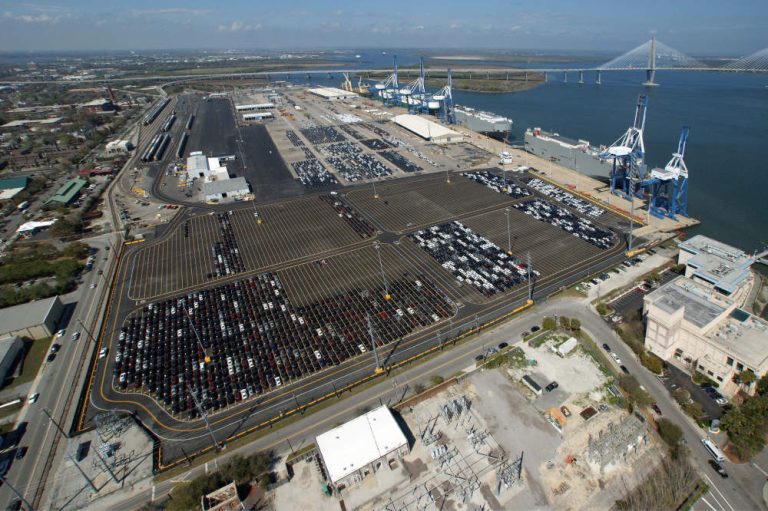Recycling, Sustainability Initiatives Flourish in South Carolina
South Carolina is home to a rapidly growing recycling industry sector, with a growing base of companies that are having a major impact on the economy and the ecology.

In the Charleston area, homeowners can have custom countertops embedded with recycled glass pieces in their favorite colors.
Chris Fisher, owner of Fisher Recycling, collects glass bottles – along with many other discarded items – from restaurants, offices and institutions and grinds the glass to make the GlassEco countertops.
Fisher is one of the entrepreneurs in South Carolina leading the way in the state’s booming recycling business. He’s created products to utilize the items he recycles, including oyster shells and food waste transformed into compost.
“We’ve built a machine where one product goes in and seven different products come out of one glass bottle,” Fisher says. “Finding a profitable marketing on the backend will always be a challenge, especially when you’re introducing new products into the market.”
Going Green: Cash and Ecology
Sustainability isn’t just a buzzword in South Carolina. It’s big business. A number of sustainability projects are having a major impact in the state, with about 500 companies involved, including collectors, processors, recycled-product manufacturers and equipment makers. In 2012 alone, 19 recycling companies located or expanded operations in the state, creating 770 jobs and $463 million in investment.
“Our recycling industry is growing, and we continue to create new jobs in the industry,” says Chantal Fryer, senior manager-recycling market division for the South Carolina Commerce Department. “We want folks to know that recycling is good for the economy as well as the environment.”
A number of companies in the state accept a variety of plastics from residential and industrial sources and process them into feedstock for new products that range from food and beverage containers to carpet, textiles and automotive parts.
The Carolinas Plastics Recycling Council is collaborating with public and private partners to boost plastic bottle recycling.
“We estimate about 300 million plastic bottles go into landfills each year, and we have 15 companies in the Carolinas that can take those bottles and find a new use for them,” Fryer says.
Growing the Ecosystem
In Johnsonville, Wellman Plastics Recycling LLC offers a variety of products for the automotive, lawn and garden, consumer products, and electronics industries made from recycled plastic, nylon and resin. The company launched a nylon product that features 100 percent post-consumer waste – nylon carpeting ground into fiber and recaptured through a proprietary process. The product is used in cylinder-head covers made of recycled material on Ford Motor Co.’s 3.0-liter Duratec engine, says Glen Odom, vice president of raw material development.
Wellman has invested $5.5 million to expand its existing 2.2 million-square-foot manufacturing and development facility that will also add 50 jobs to the region.
At BMW Manufacturing Co. in Spartanburg, the company has woven sustainability throughout its entire operation. Solid waste recycling programs reduce the need for landfills, a water conservation initiative helps save 9.5 million gallons of water a year and a comprehensive energy-efficiency plan saves energy and reduces CO2 emissions. In 2011 alone, Plant Spartanburg saved nearly 30 million kilowatt hours at an annual savings of nearly $1.5 million.
In February 2012, BMW added new solar panels to provide solar energy to power the 24,000-square-foot Zentrum Museum and three new electric-vehicle charging stations (available for public use). The 400 solar modules, each capable of producing 240 watts of energy, save approximately 135,000 kilowatt hours per year, says Sky Foster, communications manager for BMW. The company has found South Carolina to be supportive of its sustainability efforts.
“For example, the sustainability of our workforce development strategy has been accomplished through a long-standing relationship with the state’s technical colleges, as well as our graduate automotive engineering program with Clemson University,” Foster says. “Also, the South Carolina Research Authority (SCRA) and South Carolina Hydrogen and Fuel Cell Coalition have been instrumental in our implementation of the world’s largest hydrogen fuel cell material handling fleet.”
For companies considering sustainability initiatives, BMW offers some hard-won lessons.
“Benchmark other companies, do your homework and, if possible, pilot projects internally first prior to a system-wide rollout,” Foster says.
